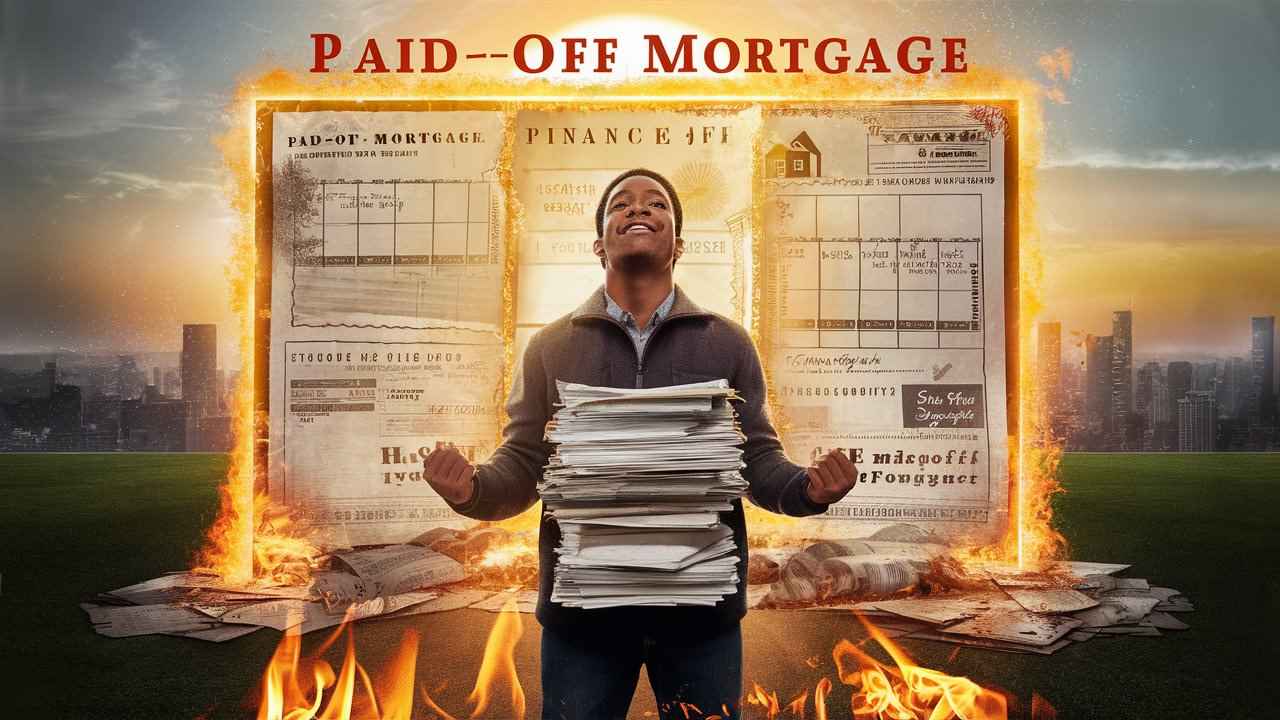The Timeless Tug-of-War Between Paying Off Your Mortgage and Investing
The question of whether to Pay Off Your Mortgage or Invest has plagued homeowners and finance enthusiasts for decades. On one hand, the allure of living debt-free whispers sweet nothings to your peace of mind. On the other, the seductive promise of growing your money exponentially in the market makes your calculator fingers itch. It’s a dilemma as old as budgeting itself.

Why Getting It Wrong Could Cost You Big Time
Making the wrong call isn’t just a minor financial faux pas🤑it’s a potential wealth disaster. Choosing poorly could mean sacrificing thousands in interest savings or missing out on decades of compound growth. In the financial jungle, the stakes are high, and your bank account is the prey.
TAKING in the Basics
What Does It Mean to Pay Off Your Mortgage Early
To Pay Off Your Mortgage early is to shave years off your loan term by making extra payments, often targeting the principal. It’s a strategy for those who value the certainty of being debt-free over the potential of high returns elsewhere. But be warned: early payoff could lock up cash that might be more productive elsewhere.
The Basics of Investing and How It Grows Your Money
Investing means putting your money to work in assets like stocks, bonds, real estate, or mutual funds with the expectation of earning returns. Through the magic of compound interest, your investments snowball over time, transforming modest contributions into a financial powerhouse. The earlier you start, the more powerful this effect becomes.🤑
Why This Decision Feels Like Choosing Between Your Kids
Deciding between these options can feel painfully personal. Do you nurture the safety net of your home or the growth potential of your portfolio? It’s like trying to choose a favorite child, but with fewer tears (hopefully) and more spreadsheets.

The Emotional Angle
The Sweet, Sweet Sound of Being Mortgage-Free
Imagine the day you make your last mortgage payment. No more monthly drain, no more interest. Just you and your home, completely yours. It’s the financial equivalent of running through a field of daisies, except you’re also saving tens of thousands of dollars.
The Thrill of Watching Your Investments Skyrocket
Nothing beats the adrenaline rush of watching your investments outperform expectations. Seeing your money multiply while you sip coffee feels like winning at life, even if the market occasionally delivers a gut-punch.🤑
The Fear of Regret When You Pick the Wrong Path
The fear of choosing wrong can be paralyzing. Pay off your mortgage too soon, and you might miss out on decades of stock market gains. Invest aggressively, and you could find yourself drowning in debt when rates rise. It’s a classic case of analysis paralysis.

Financial Factors to Consider
Interest Rates and Their Sneaky Impact on Your Decision
Low mortgage rates make investing more appealing since your debt costs you less. Conversely, high rates may tip the scales toward paying off that mortgage. Know your rate🤑it’s the silent puppet master of this decision.
Compound Interest The Magic Sauce of Investing
Compound interest is the financial MVP, turning modest investments into future fortunes. By reinvesting earnings, your money grows exponentially, proving that patience isn’t just a virtue🤑it’s profitable.
The Real Cost of Debt What Your Mortgage Is Hiding
Mortgages aren’t just about interest rates; fees, taxes, and opportunity costs lurk beneath the surface. Understanding the true cost of your debt is critical to making an informed choice.

Lifestyle and Personal Goals
Do You Crave Security or a Bigger Bank Account
Some people sleep better knowing they own their home outright. Others thrive on the excitement of a robust investment portfolio. Which one sounds like you?🤑
How Age and Retirement Goals Shape Your Choice
Your age matters. Younger investors have time to recover from risks, making the market a tempting playground. For those nearing retirement, reducing debt might provide much-needed peace of mind.
Balancing Risk and Reward to Match Your Comfort Zone
Not everyone is cut out for the stock market’s wild ride. If the thought of volatility gives you palpitations, paying down debt might be your best bet. Know thyself before diving in.

Tax Implications
Mortgage Interest Deduction Friend or Foe
The Mortgage Interest Deduction can be a lifesaver, reducing your taxable income. But as your loan balance shrinks, so does this benefit, making investing increasingly attractive.🤑
Tax Advantages of Investing Are They Worth It
Investing comes with its own tax perks, like Roth IRA or 401(k) benefits. Understanding these can tilt the scale in favor of putting your money to work in the market.
Avoiding Tax Traps When Switching Strategies
Switching from paying off debt to investing (or vice versa) can trigger unexpected tax consequences. Consult a pro before making any drastic moves.

Crunching the Numbers
Creating a Side-by-Side Comparison of Costs and Benefits
Break out the spreadsheets. Comparing the cost of mortgage interest against potential investment returns is the only way to see which option wins for you.🤑
When Mortgage Rates Beat Market Returns and Vice Versa
There are times when the market underperforms your mortgage rate, and vice versa. Knowing when this happens could save or earn you thousands.
How to Factor Inflation Into Your Calculations
Inflation erodes the value of debt and cash alike. Understanding its impact ensures you don’t end up poorer while trying to get richer.
Common Money Mistakes to Dodge
Ignoring Your Emergency Fund in the Name of Freedom
Draining your savings to pay off your mortgage or Invest is a common blunder. Without a safety net, one unexpected expense can throw your finances into chaos.
Betting It All on a Single Investment or Goal
All your eggs in one basket is a recipe for disaster. Diversify, whether you’re paying down debt or investing, to protect yourself from the unexpected.🤑
Letting FOMO Drive Your Financial Decisions
The fear of missing out can push you into hasty decisions. Stay grounded in the math, not the hype.
Expert Insights
What Financial Planners Say About This Age-Old Debate
Most experts agree: balance is key. A blended strategy often reaps the best rewards while minimizing risk.
Real-Life Stories of Success and Regret
From debt-free homeowners to high-risk investors, real-life anecdotes offer valuable lessons in what to do🤑and what to avoid.
The Pros and Cons of Hiring a Financial Advisor
A CFP can help navigate this tricky terrain, but they come with fees. Weigh the cost against the clarity they provide.
Making the Big Decision
Creating a Plan That Combines Both Strategies
Who says you have to pick one? A hybrid approach allows you to tackle debt while growing your investments.
Revisiting Your Decision When Life Throws Curveballs
Life changes fast. Periodically review your strategy to ensure it still aligns with your goals and circumstances.
Celebrating Small Wins Along the Way
Whether it’s a paid-off car or hitting your first investment milestone, take time to savor your progress.
Conclusion
The Best Choice Is the One That Works for You
There’s no universal answer to the Pay Off Your Mortgage or Invest debate. The right choice depends on your unique goals, numbers, and temperament.
Taking Action to Avoid Costly Money Mistakes Today
Start small, stay consistent, and keep learning. With the right strategy, you can dodge costly mistakes and pave your way to financial freedom.
People Also Ask
Can I Fully Pay Off My Mortgage?
Yes, you can fully Pay Off Your Mortgage by settling the outstanding balance with your lender. This can be achieved through extra payments, refinancing, or a lump-sum payoff. However, check your loan terms for any prepayment penalties before proceeding.
How Do I Pay Off a 30-Year Mortgage in 10 Years?
To pay off a 30-year mortgage in 10 years:
- Make biweekly payments instead of monthly ones.
- Allocate bonuses or tax refunds to your mortgage.
- Refinance to a shorter loan term with a lower interest rate.
- Increase your monthly payment amount to reduce the principal faster.
What Do You Call Paying Off a Mortgage?
Paying off a mortgage is commonly referred to as “mortgage payoff” or “loan satisfaction.” It means you have settled the loan balance, and the lender no longer holds a lien on your property.
What Happens After You Fully Pay Off Your Mortgage?
Once you fully Pay Off Your Mortgage, you’ll receive a mortgage satisfaction letter from your lender. The lien on your home is released, and you own your property outright. You must also ensure that the property title is updated and insurance premiums and taxes are managed independently.
What Is the Smartest Way to Pay Off Your Mortgage?
The smartest way to Pay Off Your Mortgage includes:
- Making extra principal payments regularly.
- Refinancing to a lower interest rate or shorter term.
- Avoiding unnecessary fees and penalties.
- Prioritizing high-interest debt before tackling the mortgage.
At What Age Should You Pay Off Your Mortgage?
Ideally, aim to Pay Off Your Mortgage by retirement age, around 60 to 65, to reduce financial burdens during your golden years. However, this varies based on personal financial goals and circumstances.
What Happens When Your Mortgage Balance Is Zero?
When your mortgage balance hits zero, you own your property free and clear. Ensure your lender removes their lien from the title, and celebrate the milestone of becoming mortgage-free.
Is It Better to Pay Off a Mortgage or Invest?
The decision to Pay Off Your Mortgage or Invest depends on factors like interest rates, market returns, and your financial goals. Paying off debt provides guaranteed savings, while investing offers growth potential but comes with risks.
What Happens If I Pay an Extra $100 a Month on My Mortgage?
Paying an extra $100 monthly reduces your loan’s principal balance faster. This strategy can shave years off your mortgage term and save thousands in interest over time.
Can I Pay Off My Mortgage Early Without Penalty?
Some mortgages have prepayment penalties, so check your loan terms before making early payments. Many lenders allow partial or full prepayments without penalties after a specific period.
Can I Pay My Mortgage Daily?
While paying daily isn’t common, it’s possible if your lender accepts it. Daily payments could marginally reduce your interest by decreasing the average daily balance.
Is It Good or Bad to Pay Off Your Mortgage?
Paying off your mortgage can provide financial freedom and peace of mind. However, it may tie up liquidity that could be used for investments or emergencies. Consider your overall financial situation.
What Do I Do After I Pay Off My Mortgage?
After you Pay Off Your Mortgage, update your property title, manage taxes and insurance directly, and consider redirecting funds to investments or retirement savings.
What Happens If I Pay 3 Extra Mortgage Payments a Year?
Making three extra payments annually significantly reduces your loan term. For example, on a 30-year mortgage, you could cut down the duration by 6-8 years and save a substantial amount on interest.
Is It Better to Be Mortgage-Free?
Being mortgage-free can lower financial stress and increase cash flow. However, it’s essential to weigh the benefits of liquidity and potential investment returns against early payoff.
What Is the Penalty for Paying Off Mortgage?
Penalties for early payoff vary by lender and loan type. These can include flat fees or a percentage of the remaining balance. Always review your loan terms or consult with your lender.
Do You Get a Refund When You Pay Off Your Mortgage?
If you have an escrow account for taxes or insurance, any remaining funds will be refunded to you after the mortgage is fully paid off.
What Happens After You Pay Off Your Mortgage?
After your mortgage is paid off, the lender provides a payoff statement, removes the lien on your property, and refunds any unused escrow funds. You’ll need to handle taxes and insurance independently.
Is It Better to Have Cash or Pay Off Mortgage?
Having cash provides liquidity for emergencies or investment opportunities, while paying off your mortgage offers guaranteed savings. Strike a balance based on your financial priorities.
Why Pay Off a Mortgage Early?
Paying off your mortgage early reduces interest costs, frees up monthly cash flow, and provides the security of owning your home outright.
How Much Debt Does the Average 35-Year-Old Have?
The average 35-year-old in the US carries about $42,000 in total debt, including mortgages, student loans, and credit card debt, according to Federal Reserve data.









